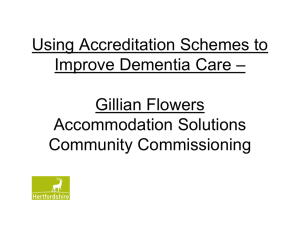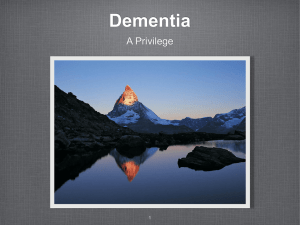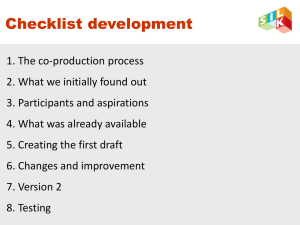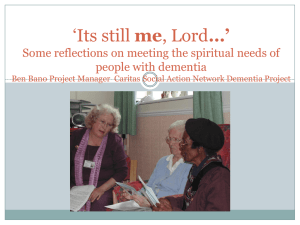Dementia presentations - North East London NHS Foundation Trust
advertisement
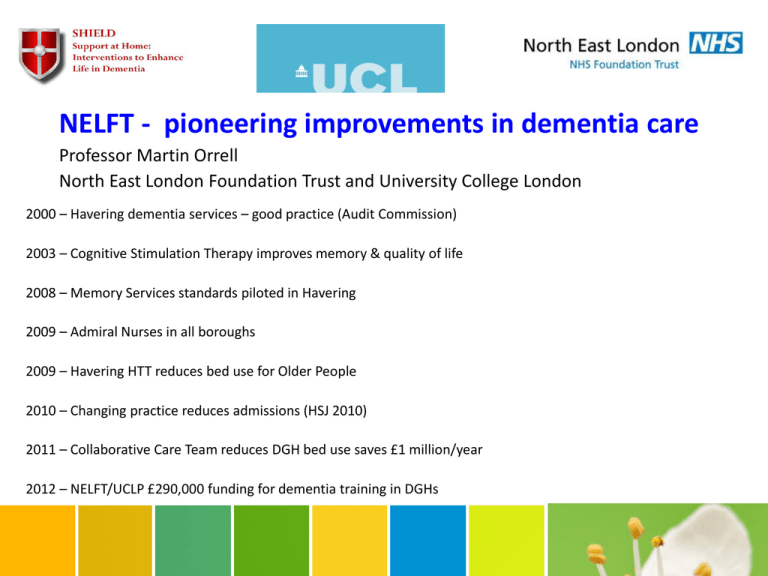
NELFT - pioneering improvements in dementia care Professor Martin Orrell North East London Foundation Trust and University College London 2000 – Havering dementia services – good practice (Audit Commission) 2003 – Cognitive Stimulation Therapy improves memory & quality of life 2008 – Memory Services standards piloted in Havering 2009 – Admiral Nurses in all boroughs 2009 – Havering HTT reduces bed use for Older People 2010 – Changing practice reduces admissions (HSJ 2010) 2011 – Collaborative Care Team reduces DGH bed use saves £1 million/year 2012 – NELFT/UCLP £290,000 funding for dementia training in DGHs NICE-SCIE guidance (2006) www.nice.org.uk People with mild/moderate dementia of all types should be given the opportunity to participate in a structured group cognitive stimulation programme … provided by workers with training and supervision … irrespective of any anti-dementia drug received …’ Cognitive Stimulation Therapy (Spector et al., 2003) • n = 201 - 23 centres (18 care homes, 5 day care) • A multicentre Randomised Controlled Trial (RCT) • Significant improvement in cognition & quality of life • Cost effective (Knapp et al., 2006) • Numbers needed to treat for cognition = 6 • similar to dementia medication Maintenance CST Trial – first results 236 participants (123 MCST/123 CST only) After 6 months MCST Quality of life better After 3 months MCST significant benefits Quality of life better (proxy) Activities of Daily Living better MMSE improved in MCST group 0.85 points What is the Individual CST programme? • Delivered by carer 2 times a week for 20-30 minutes • 75 individual CST sessions • 25 week programme • Themed activities eg: Number Games • Manuals and resource workbook Positive outcomes for carers I’m glad we have iCST, it has given us a lot of help The programme has given me ideas I never would have thought of It has taught us how to work on the things that matter, and ignore the things that don’t I feel like I have a purpose when spending time with dad The programme has given me more tolerance It made us realise that parts of mum’s memory work, and others don’t I cannot say how much of a difference this has made to my relationship with my mother We’ve had some nice enjoyable times doing the activities together CST work • ADI World Alzheimer Report recommends CST • Training evaluation part of the SHIELD programme • Cochrane review support CST – Woods et al., 2012 CST website: www.cstdementia.com Join the CST Network - email a.spector@ucl.ac.uk UCLPartners - dementia stream Improving care in general hospitals Involving families/carers Managing delirium Education & training BEH + NMUT CIFT + UCLH + RFH ELFT + BLT NELFT + BHR Joined-up working Step 1 Planning & consensus conference - June 2011 Step 2 Commitment - September 2011 Local leadership groups - acute Trust lead Commitment to select objectives to work with Define time line, outcomes, actions Step 3 Review progress - January 2012 5 acute trusts UCLH, RFH, NMUH, BHR, Newham present with discussion of progress & outcomes £2 million saving, 1700 staff trained Step 4 Review outcomes - June 2012 awarded £290,000 grant to increase training across UCLP/NELFT (Orrell/Lourenco) Collaborative Care Team BHR Trust Dr Steve O’Connor & Caroline O’Haire Investment from PCT £0.4 million/year Queens admitted 30,000 people 65+ in 2010/11 June-Oct 2011 - 998 pts dementia admitted/recognised Average 1.2 days less than previous year = 1198 fewer days 5 months saving = 1198 X £350 (bed day cost) = £419,300 1 year savings estimated = £1 million Changing practice to reduce admissions for people with dementia Dr Afifa Qazi Havering Older People’s services Havering - 40,700 over 65yrs 3400 with dementia 30% (1100) of those in care homes Very low admission rates Bed Days per 10,000 population 2000 1800 1600 1400 1200 1000 800 600 400 200 0 Team A Team B Team C Team D Team E Team F Team G Team H Team I Low bed base Bed Occupancy per 10,000 population 16 14 12 10 8 6 4 2 0 Team A Team B Team C Team D Team E Team F Team G Team H Team I RCPsych Changing practice Close links GPs/practice nurses, care home, CMHTs consultant mobile number Quick response (same day) Talks/ training at surgeries/selected care homes GP Face to face discussions (eg acute confusion) At care homes able to identify difficulties before crisis (no admissions for 2 yrs) CMHT joint visits, support, discussion Clinic - emergency slots for patients in crisis Frequent follow ups for acutely unwell patients (2-4 weekly) Encourage patients to ring in case of problems (contact sheet with secretaries number) Building on Innovative services with Prof Burns ‘future of old age psychiatry’ Conclusion Bed occupancy - <10% of RCPsych bed numbers Access - support Training - development Liaising - providing the missing link 1/3 of beds of other NELFT consultants Changing practice: reduces admissions cost effective popular with CMHT, care homes and GPs adds to effects of home treatment services takes time for full effects Memory Services National Accreditation Programme (MSNAP) 58 members 24 accredited 18 as excellent 30 in review stage Prime Minister’s Challenge on dementia increase number of MSNAP accredited clinics promote research in clinics Four main stages to the accreditation process: Self review – 3 months Peer review – 1 day visit MSNAP Accreditation Advisory Committee (AAC) – RCPsych, BPS, RCN, Alz Soc, COT Royal College of Psychiatrists’ Committee (ETSC) Education, Training and Standards Improvements Increase in % referrals seen 4-6 weeks Reduction in % staff lack of training funding Funding to open physical examination unit Assigned a medical lead for the service New information leaflets/packs developed for people with dementia and carers Implementation of checklist for assessments Possible reasons for improvement The programme does not end after accreditation Areas for improvement highlighted Peers suggest ways of improving these Service encouraged to create action plan to address areas for improvement Short and long term goals Action plan revisited after 1 year Sophie Hodge shodge@cru.rcpsych.ac.uk 020 7977 4971 www.rcpsych.ac.uk/memory-network Memory Services Register is now live at www.rcpsych.ac.uk/memory-services-register Dementia Strategy in NELFT Stephanie Dawe - Chief Nurse & Executive Director of Mental Health 24 September NELFT AGM Where we are – size of the challenge… Nationally, there are approx 700,000 people in the UK with dementia. Expected to double in the next thirty years to 1.4 million with the cost of services/care increasing to over £50billion a year* Locally, South West Essex the population of people >65yrs is approx 63,544 of whom 4,458 (14%) have dementia***. Locally (Outer North East London boroughs) prevalence data for adults >65yrs reported for 2009,** shows: Borough Population 65+ Dementia % Barking & Dagenham 21 227 1732 8 Havering 37 246 2807 8 Redbridge 31 483 2428 8 Waltham Forest 25 397 1895 7 ONEL total 115 353 8862 8 Currently across NELFT there are varying levels of work/engagement, this varies by business unit and also by borough, much of this relates to the historic levels of investment in dementia services *Source: DoH 2009 **Source: Dr S O’Connor Assox medical director presentation 20.10.11 ***Source: GP data from ESSA) continuing to improve… The National Dementia Strategy (2009) outlined 17 objectives to achieve improvements in dementia care. Transformation project aims to improve care in a number of key areas: Improve awareness - through knowledge transfer and training Earlier diagnosis and intervention - through robust pathways across the system High quality care - through translation of research into action and training Achievements and next steps…….. Service transformation: Standardised screening tools Early detection and treatment Consistent delivery of Memory Services Integrated Community Treatment Teams with BHRUT End of life care pathways Research & Development event later in year: Showcase dementia diagnosis and care Research into action. Training: Train the trainer programme with Stirling University in progress Promotion: Website with materials available for sharing DIST Team Structure (within Unplanned Care) RGN Band 7 ADMIN RMN Band 7 RGN Band 6 RMN Band 6 Support Worker Band 3 Support worker Band 3 DIST Role within primary care Assess and refer to appropriate services (i.e. CAS, memory service, social services & 3rd sector services , Community) Provide short term intervention (6 weeks), monitoring and support and act on any increase risks Work in collaboration with AAT (Admission Avoidance Team), Care Home Liaison Nurses, GPs, Community Teams ,OPMHT Provide information and advice to PWD and their carers (i.e. medication and behaviour management and symptoms & UTI prevention) Provide faster access to services and earlier diagnosis DIST Role within secondary care •Work alongside AAT, CCMT and social services to avoid inappropriate admissions and follow up in the community; •Work alongside Clinical nurse Specialist, Complex Case Management Team and Social Services to reduce the length of stay in hospital; •Promote and facilitate the use of intermediate care for people with dementia; •Identify and review PWD or those experiencing memory problems and support in the community. DIST Pathway Referral to DIST via •Community Services •GP’s •Ambulance Referral •AAT •Wards •3rd Sector •Individuals Referred to/ Follow-up by DIST up to 6 weeks • • • • • • • • • • Memory Service CMHT Inpatient Services MH & Community Hospital Reablement Social Services Care Home Liaison Team ICT Services 3rd Sector (Alzheimer’s, Befriending etc.) Outcomes Number of referrals received 1154 Discharged from Hospital with DIST support 608 Seen in A&E / Amu (not admitted) including ambulance referrals 402 Admission Avoidance Team referrals 77 GP referrals 77 Memory service requests forwarded 118 CAS request for CMHT input 41 Case Study 2 Patient ‘B’ Referred by GP, lives with husband, has carer 1 x daily. No formal diagnosis but experiencing memory problems. Becoming agitated, confused, aggressive, keeps pulling her catheter out (feels she does not need it) and at one time used scissors, hoarding tablets. Refused to go to A&E or hospital. Husband is burnt out. What we did:•Assessed and monitored risk and supported for 4 weeks; •Requested an urgent psychiatric review of medication; •Liaised with district nursing team to support with the catheter issue on a daily basis and worked closely with the team; •Liaised with social services for an increase in care package and future respite for her husband; •DIST referred to the memory service for further assessment; •Patient transferred to the mental health services after 4 weeks Admission to hospital avoided Referral Details Dementia Intensive Support Team A&E Department Basildon & Thurrock University Hospital (BTUH) Nethermayne Basildon, Essex SS16 5NL Tel: 01268 524900 Ext. 2873 Fax: 01268 246895 Email: dist@btuh.nhs.uk (for information only – not referral) NELFT AGM Dementia within the Older Adults Care Pathway Mental Health Services September 2012 Sarah Haspel Assistant Operational Director Dave Horne Operational Director Steve O’Connor Assistant Medical Director CONTENTS Context Existing provision New care pathway Building on Innovative services The Context for Mental Health Services National Dementia Strategy ‘..specific provision needs to be made in terms of specialist community mental health teams and inpatient services for older people with mental disorder. The separation of ‘organic’ and ‘functional’ disorders in terms of service provision is essentially a false dichotomy and one that is likely to disadvantage people with dementia with complex needs and their family carers.’ Short stories from Queens Mr S - 72 years old Mrs P – 68 years old Present patient journey Our new pathway – under consultation Intention of care pathway for Older Adults and Cognitive Disorders - 5 key elements 1. Single point of access for all four boroughs 2. Standardisation of assessment processes 3. Management of all liaison services 4. Multi-disciplinary Community Clinics 5. Ability to define “care packages” for Mental Health Payment by Results Building on Innovative services with Prof Burns Young people with Dementia Specialist knowledge and skills Cognitive disorders clinic Specialist clinical nurses Specific Support group Research into Practice: SHIELD Support at Home: Interventions to Enhance Life in Dementia £2 million, 5 Years, National Institute of Health Research Maintenance Cognitive Stimulation Therapy (CST) groups improve cognition & quality of life of people with dementia Reminiscence groups - dementia SU & carers to maintain quality of life & improve relationships Carer supporter programme - trains ex-carers to support new carers of people with dementia Home treatment package - help to manage crises at home, reducing dementia hospital admissions Training manuals - help other services approaches. Old Age Liaison pathway Whipps Cross pilot and RAID 6 weeks pilot in Whipps Cross Building on learning from Collaborative Care Team for OA Liaison in Queens Modelling RAID from Birmingham – cross speciality service for mental health liaison with outreach Impact Time to assessment General hospital staff confidence Contacts NELFT Mental Health Services Sarah.Haspel@nelft.nhs.uk David.Horne@nelft.nhs.uk Stephen.O’connor@nelft.nhs.uk Background slides Another slide for CQUIN Dementia and Mental Illness in our 4 boroughs From 2009 Population 65+ Barking and Dagenham 21,227 Havering Depression Schizophrenia 36 1,732 3,184 212 37,246 57 2,807 5,587 372 Redbridge 31,483 57 2,428 4,722 315 Waltham Forest 25,397 48 1,895 3,809 254 ONEL Total 115,353 8,862 17,302 1,153 7.7% (0.2%) 15% 1% Percentage Dementia What we offer from NELFT Mental Health Services Older Adult Memory Services Admiral Day Services Liaison Home Treatment Team Nurses Mental Including YPD Team B&D Yes Yes Two Yes Queens Collaborative Care Team (CCT) Yes Redbridge Yes Yes Two Groups King Georges / WXH 2 nurses Yes Havering Yes Yes Two No Queens CCT Yes Waltham Forest Yes Yes One Yes Whipps Cross 1 nurse No Why Liaison…Dementia and Severe Mental Illness in Acute care Dementia: 42%>65 years admitted have dementia, 50% undiagnosed, 3X more likely to die, 43% admissions avoidable (Sampson et al 2009) Delirium: doubles Length of Stay (LOS) and halves chances of returning home successfully. 30 - 40% is preventable. Depression: associated with increased LOS, mortality rates, health care costs and dependency. Low detection rates Solutions…. Liaison can improve outcomes (clinical, LOS, readmission health, care utilisation) and refer to community services. Interventions for those with Dementia in MHS Cognitive Stimulation Therapy Assessment Reality Orientation Diagnosis Reminiscence Medication Eco Therapy Signposting Mindfulness-based Cognitive Therapy Anxiety Management Mental Health Promotion Admiral Nurses engagement with carers Support Delivering Dept of Health commitment to reduce antipsychotic prescribing in Dementia… Low bed base – too SMI? Clinical Outcomes – is this too SMI? Use for notes to present pathway Aim to increase time available for new assessments (increase diagnostic rates and reduce waiting times) End to indefinite Memory Clinic follow-up by Psychiatrists Specialist nurse-led follow-up clinic for those with ongoing needs Discharge to GP where Acceptance of patient stable and carer agreeable future re-referral as necessary Dementia has progressed to severe stage Consideration of stopping anti-dementia drug Assessment and management of behavioural / psychological symptoms (BPSD) New developments.. Cognitive Stimulation Therapy Bringing NELFT research into our Mental Health Services Development for CST in care homes via special funds from Redbridge commissioners






